- R GENERATION
- Posts
- ☕️ (R)emote Expresso #47
☕️ (R)emote Expresso #47
The Performance Review Ghost: When Visibility Becomes Surveillance
☕️ (R)emote Expresso is your weekly dose of creator insights on remote collaboration designed to fuel your day, delivered once a week in your inbox 💌

Hey Remote Rebels and Digital Daydreamers,
Ever get the feeling someone's watching? Not in the fun, "is my house haunted?" way – in the "did my screen just get screenshot?" way.
Remote work promised freedom. What we got was the performance review ghost: that creeping anxiety whispering "how do they know I'm working?" every time you dare to pee without Slacking your manager first.
Here’s the spooky reality no one asked for: Your green Slack dot is now currency. Your keyboard clicks are data. And your bathroom breaks might be getting flagged as "idle time."
Welcome to productivity paranoia, where we've traded office surveillance for digital ankle monitors – and somehow called it "flexibility."
This week, we're not optimizing your output.
We're exorcising the surveillance specter and reclaiming your humanity.
Because honestly? If one more person tries to sell us "mouse jiggler" software, we're burning down the internet. 🔥

👻 Meet the Invisible Panopticon (No, That's Not a Harry Potter Spell)
Let's get academic for exactly 90 seconds, then we'll get back to dragging surveillance culture:
The Panopticon is an 18th-century prison design by philosopher Jeremy Bentham. Picture this:
Circular building with cells facing inward
Central watchtower in the middle
Guards can see every prisoner, but prisoners can't see into the tower
The twist: Prisoners never know if they're actually being watched or not
So what do they do? They police themselves. Just in case.
French philosopher Michel Foucault later said: "Congrats, humanity, you've figured out how to make people their own jailers." (I'm paraphrasing, but that's the vibe.)
Now apply this to remote work:
Screenshot software that might be running.
Activity monitors judging your keyboard rhythm.
Webcam checks you don't see coming.
Slack statuses that turn yellow after 10 minutes and make you feel like a slacker for microwaving lunch.
You don't know when you're being watched.
So you act like you're always being watched.
And that, my friends, is the invisible panopticon. A workplace haunted house where the real monster is your own anxiety about being perceived as lazy.
Welcome to hell. There's no coffee here, only surveillance. ☕👁️
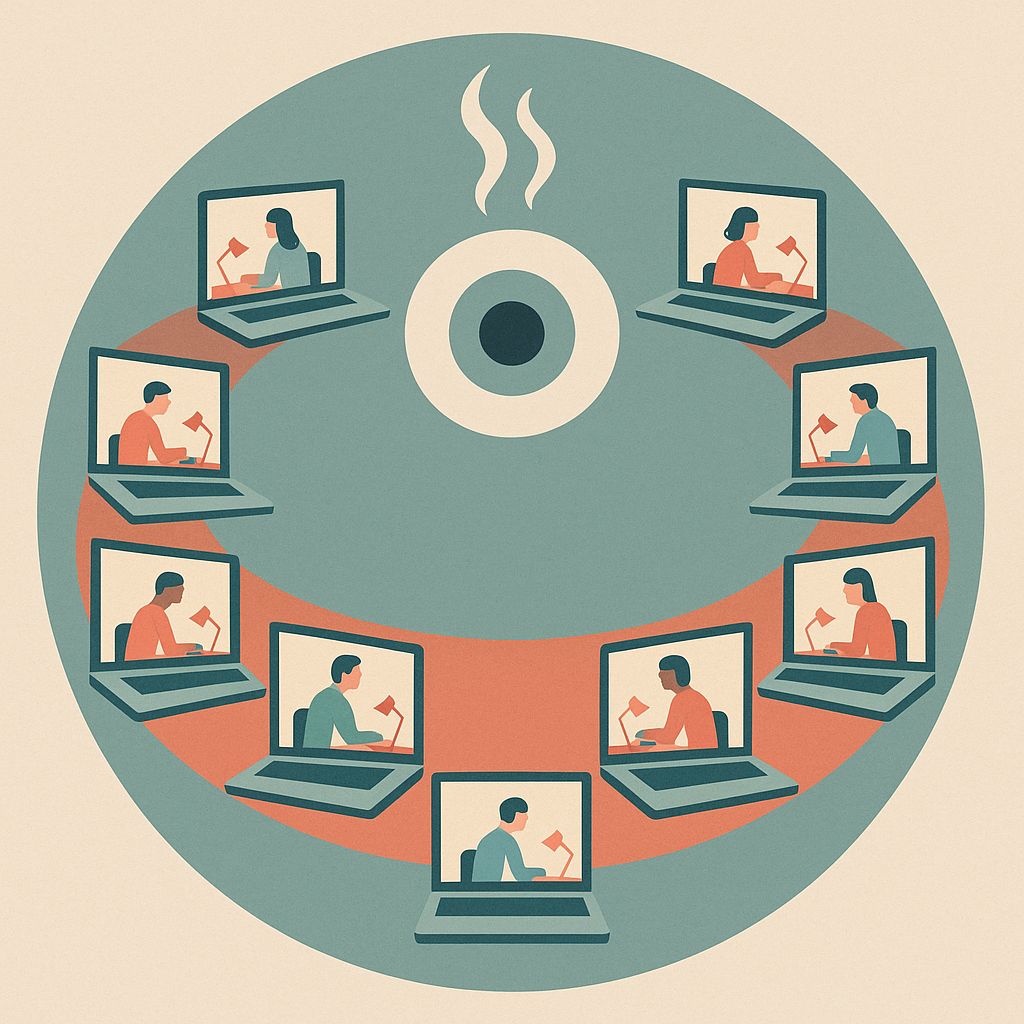
🎭 The Performance Theater Nobody Auditioned For
Remember when "trust" was a management value and not a liability?
Now we've got:
Mouse jigglers (yes, they're real, and yes, that's bleak)
Keystroke trackers measuring your WPM like you're a dystopian typist
Random screenshot captures turning your screen into evidence
"Always available" culture where stepping away feels like a felony
The result? Workers performing productivity instead of actually being productive.
You're keeping Slack green while your brain goes offline.
You're wiggling your mouse while creativity dies.
You're attending meetings you could've skipped because "visibility."
Here's the unvarnished truth:
Visibility ≠ Value.
Surveillance ≠ Support.
A green dot ≠ Good work.
And if your company can't tell the difference? That's not a remote work problem. That's a trust problem with a software budget.
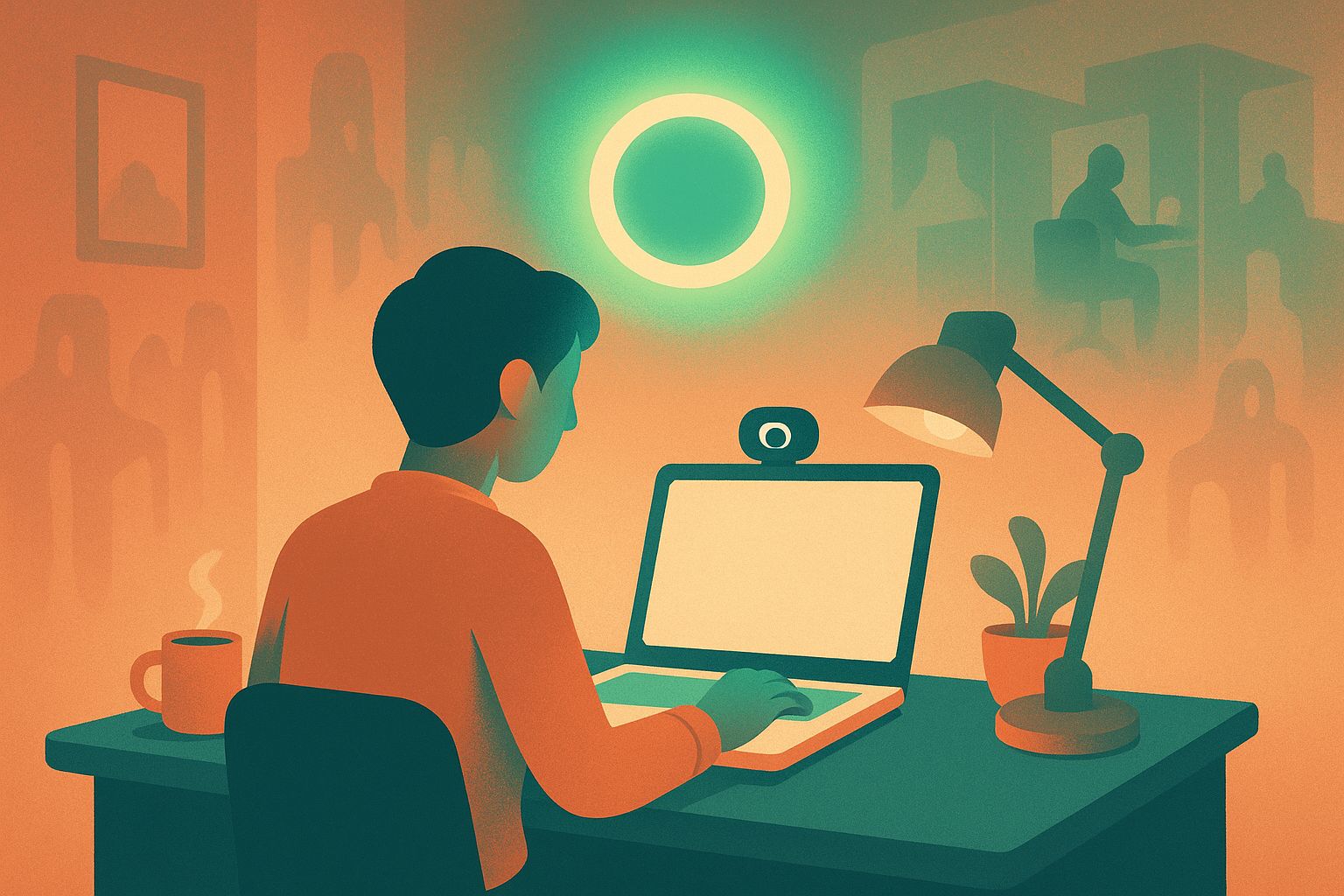
👀 How Each Generation Feels It
Gen Z: You survived Instagram's algorithm tracking your every like, TikTok mining your watch time, and now your employer wants in on the action? Surveillance is just your baseline reality now. At least TikTok was fun. This is... employment.
Millennials: You were told to hustle. Now the hustle has metrics, dashboards, and color-coded shame. Congrats – your productivity anxiety just got an AI supervisor with a spreadsheet. Living the dream! 🙃
Gen X: You built careers on "I'm leaving the office, I'll see you tomorrow." Now the office follows you home, tracks your breaks, and judges your cursor velocity. Work-life balance? More like work-life surveillance state.
Boomers: Handshakes and hallway conversations built your reputation. Remote work already felt distant. Now it's distant and paranoid. You're trying to build trust through a webcam while someone's counting your keystrokes. What fresh hell is this?
Different generations. Same digital leash. Nobody signed up for this.

🌐 Why This Belongs in (R) Generation
Because surveillance culture is the opposite of what remote work was supposed to be.
We were promised flexibility, autonomy, and trust.
We got: Big Brother, but make it SaaS.
When you treat employees like suspects, you don't unlock productivity – you unlock performance theater. People optimizing for metrics instead of outcomes. Faking presence instead of delivering brilliance.
Here's what surveillance culture actually kills:
Creativity (because innovation doesn't happen on a timer)
Psychological safety (because fear ≠ trust)
Retention (because good people leave bad systems)
The entire point of remote work (which was supposed to be about outcomes, not optics)
Trust isn't a luxury. It's infrastructure.
And when we replace trust with tracking software, we don't get better work. We get exhausted humans performing for an audience of algorithms.
The (R) GENERATION exists to build remote work that trusts people to do great work – not tracks them into submission.
If your management strategy requires spyware, the problem isn't your workers. It's your strategy. 🎤⬇️
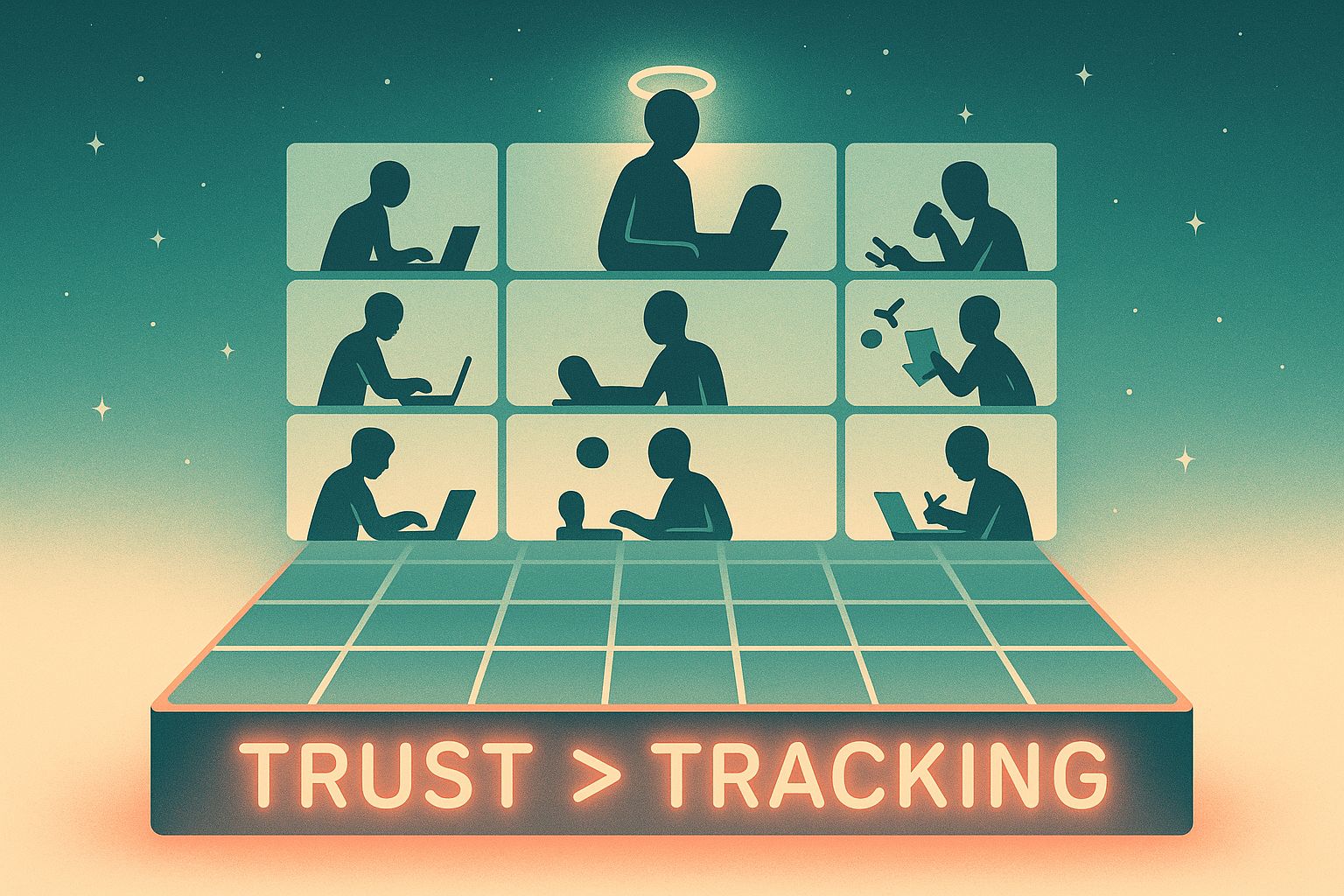
🛡️ Fixes for the Paranoia Pandemic
If you're being surveilled:
1. Name the thing.
You're not imagining this. If your employer is using tracking software, acknowledge it. To yourself. To a trusted colleague. Say it out loud: "This surveillance is affecting my mental health and work quality." Naming it takes away some of its power.
2. Shift the narrative from hours to impact.
You are not a green Slack dot. You're a human who solves problems. Start keeping a "Wins Log" – a running list of:
Problems you solved
Projects you shipped
Value you created
Fires you put out
Make it impossible to reduce you to an activity metric. When review time comes, you've got receipts. Real ones.
3. Take your breaks anyway.
If they're tracking your bathroom time, take the bathroom break anyway. Your bladder shouldn't need managerial approval. Your brain definitely needs rest. If the software flags you as "idle," let it. You're not a machine.
4. Ask the uncomfortable questions.
In your next one-on-one: "What specific problem is the monitoring software solving?" and "How does tracking my activity improve outcomes?"
Force leadership to articulate the logic. Often, there isn't any. Just vibes and venture capital.
5. Find your people.
You're not alone. Connect with colleagues who feel the same way. Organize. Collectivize. Solidarity is harder to ignore than solo complaints. (And honestly? Misery loves company, but resistance loves a group chat.)
If you're a manager considering surveillance tools:
Stop. Seriously. Full stop. Put down the software demo.
If you don't trust your team to work without a digital leash, the problem isn't remote work.
The problem is one (or more) of these:
Your hiring process
Your onboarding
Your management style
Your inability to measure what actually matters
Try this instead:
Measure outcomes, not activity. Did the thing get done? Done well? Great. That's the metric.
Check in on workload and blockers, not screen time. "What support do you need?" beats "Why were you idle for 6 minutes?"
Build feedback loops based on impact. Quarterly reviews about deliverables > daily tracking dashboards about keystrokes.
Model trust. If you're online 24/7, your team will think they have to be too. Log off. They'll follow your lead.
Surveillance software vendors will sell you "productivity insights."
What you're actually buying: A one-way ticket to a culture of suspicion, resentment, and your best people quietly updating their LinkedIn profiles.
Choose wisely. 🎯

🧩 Your Re-Entry Ritual: The Trust Audit
Before your next one-on-one (or your next existential Slack-status spiral), try this:
Step 1: Ask yourself: "Am I delivering value, or just performing visibility?"
Be honest. Are you working, or are you looking like you're working?
Step 2: List three recent contributions that had real impact.
Not hours worked. Not tasks checked off. Not how many Zoom squares you filled.
Actual. Value. Delivered.
Examples:
"Solved the client's data migration crisis in 48 hours."
"Redesigned the onboarding flow – new hires are onboarding 30% faster."
"Caught a critical bug before it shipped. Saved us from a PR nightmare."
Step 3: Share those wins. With your manager. Your team. Hell, even just yourself in a private Google Doc titled "Evidence That I'm Not a Fraud." (Editor note: I may or may not have had a folder in my Outlook drafts titled “The Wonder of Me”. 🤷🏻♀️🤦🏻♀️)
Make your value visible without making your activity surveil-able.
Step 4 (if you manage people): Ask them: "What would make you feel more trusted and supported?"
Then listen. Really listen. Write it down. Act on it.
Anchor it visibly.
This isn't about proving yourself to surveillance software.
It's about reclaiming your narrative. You're a person, not a data point.
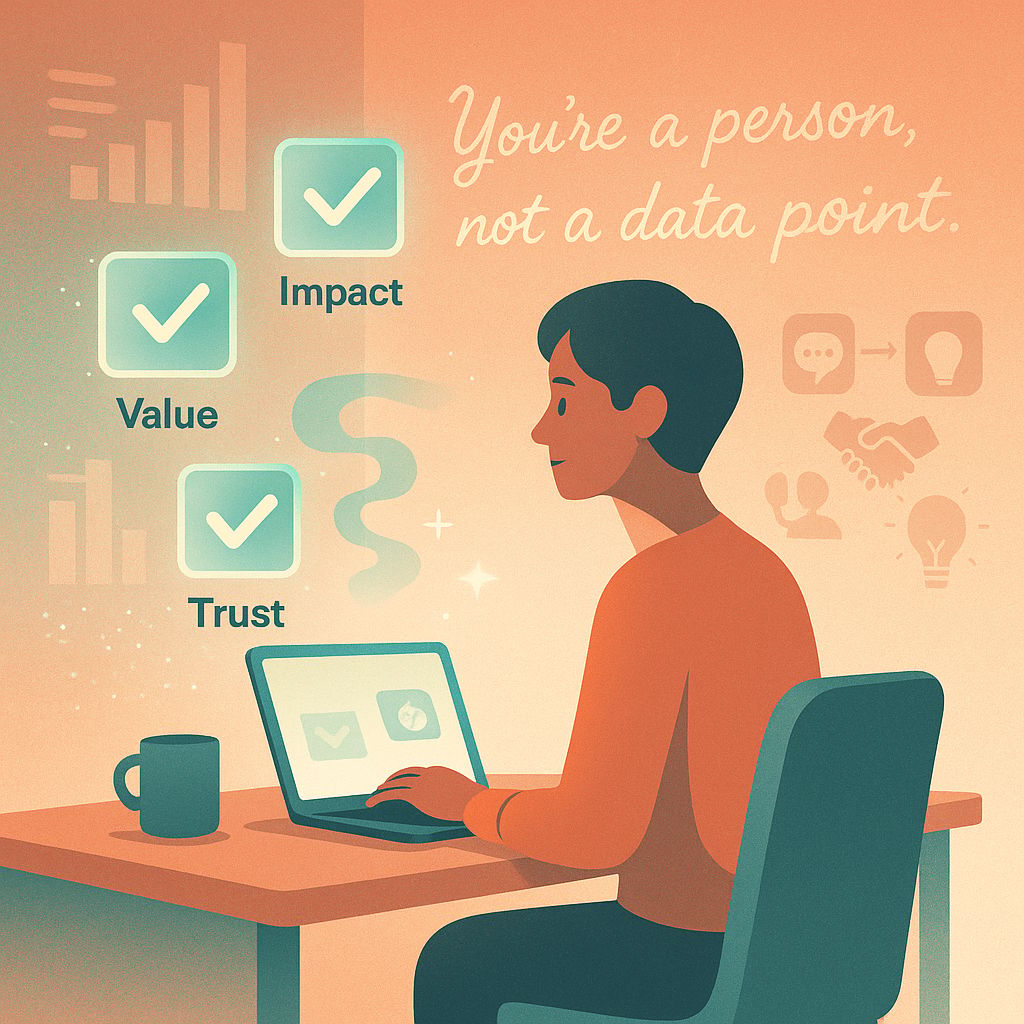
🤖 AI Prompt of the Week
For leaders reconsidering surveillance:
I work in a remote environment where productivity tracking or surveillance tools are either in use or being considered. I want to advocate for trust-based management instead. Please suggest 10 unconventional strategies (beyond the usual 'just trust people' advice) to measure and demonstrate value without surveillance. Make them: 1) grounded in research on employee autonomy, psychological safety, or performance management, 2) practical for managers who are nervous about accountability, and 3) focused on outcomes over activity. Include at least one approach that feels surprisingly human but still rigorous.
For individuals experiencing productivity paranoia:
I work remotely and sometimes feel anxious that my employer doesn't trust me or know that I'm working hard, even though I'm delivering results. Suggest 10 strategies (beyond just 'work harder' or 'be more visible') to build confidence in my value and reduce performance anxiety. Make them: 1) grounded in research on remote work or self-advocacy, 2) realistic for someone who is [insert: introverted / managing ADHD / new to remote work / caring for dependents], and 3) focused on authentic demonstration of impact, not performative productivity. Include at least one delightfully weird ritual that helps me let go of the surveillance mindset.

💬 Your Turn
What's the weirdest "productivity" expectation you've encountered in remote work?
Bonus points if it involved:
A mouse jiggler
A suspiciously timed bathroom break investigation
A Slack status existential crisis
That time you got flagged for "low activity" while literally solving a critical problem
Or confess: Have you ever caught yourself performing productivity instead of just… being productive?
Reply and tell us. The juiciest (and most relatable) stories may just haunt a future Expresso. 👻☕
— The (R) Generation Team 🧡 🫶
PS: If no one's told you today – your green Slack dot doesn't define your genius. Your work does. Keep going.

👨💻 Big Desk Energy: our biggest startup insights, & stories
✈️ Nomad Cloud: get the latest on remote work and location independence.
🌎 Thrive Remotely: lifestyle and wellness for remote workers
👩🎤 Customer Success Jobs: our remote high-paying jobs for you
🤖 Americans Abroad: insights about visas, residency, & cost of living
🔴 Creator Spotlight: inspiration for world class creators journeys

BE A PART OF
THE R GENERATION COMMUNITY

 JOIN A GLOBAL COMMUNITYConnect with 7,000+ remote professionals, creators, |  ACCESS |  ACCELERATE |
R GENERATION brings together remote professionals from 50+ countries to explore the future of work through events, workshops, and AI-powered collaboration. Join a community where curiosity meets innovation and connections transcend borders.
Your worth isn't measured in green dots. It's built in trust. 🟢👻

What did you think of this issue?BE REAL. We love hearing from you! |

 |
|
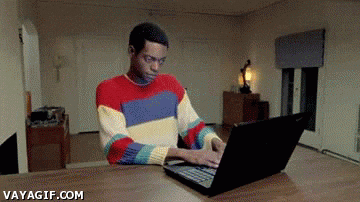
😳
Reply